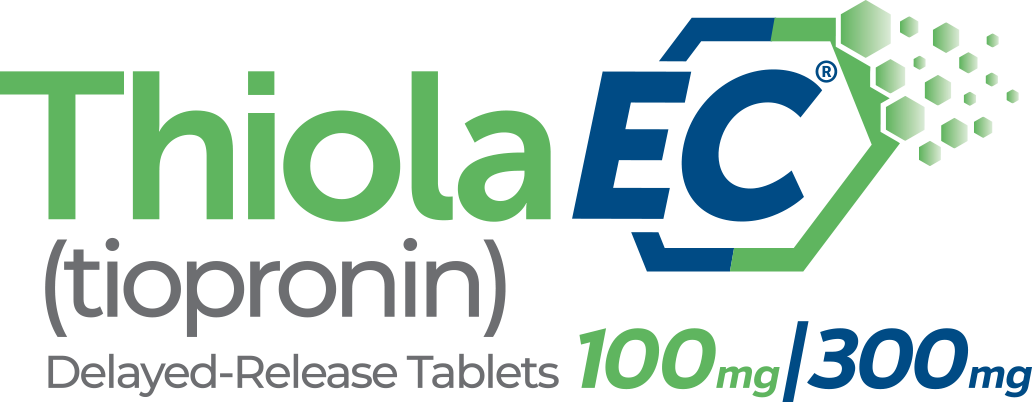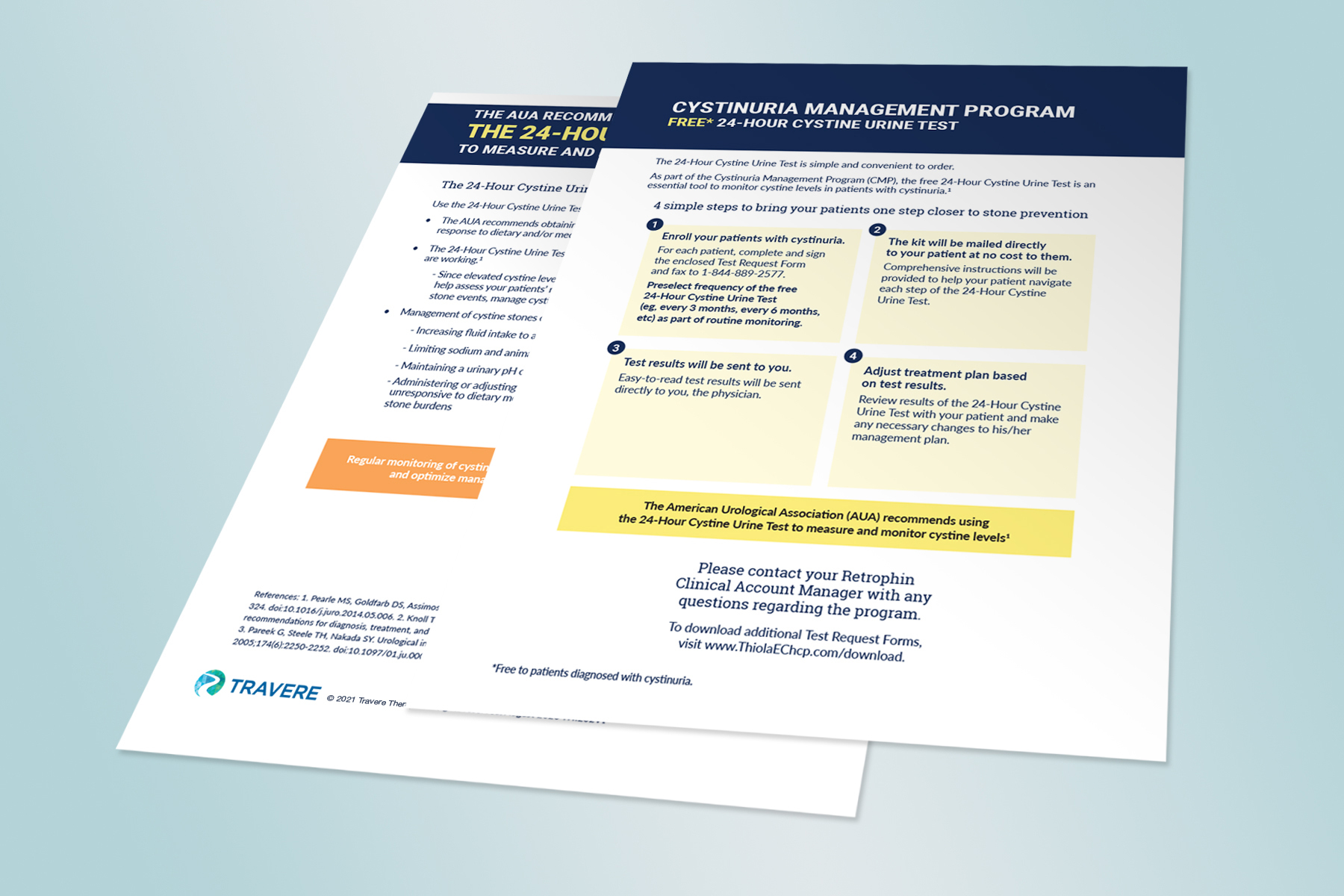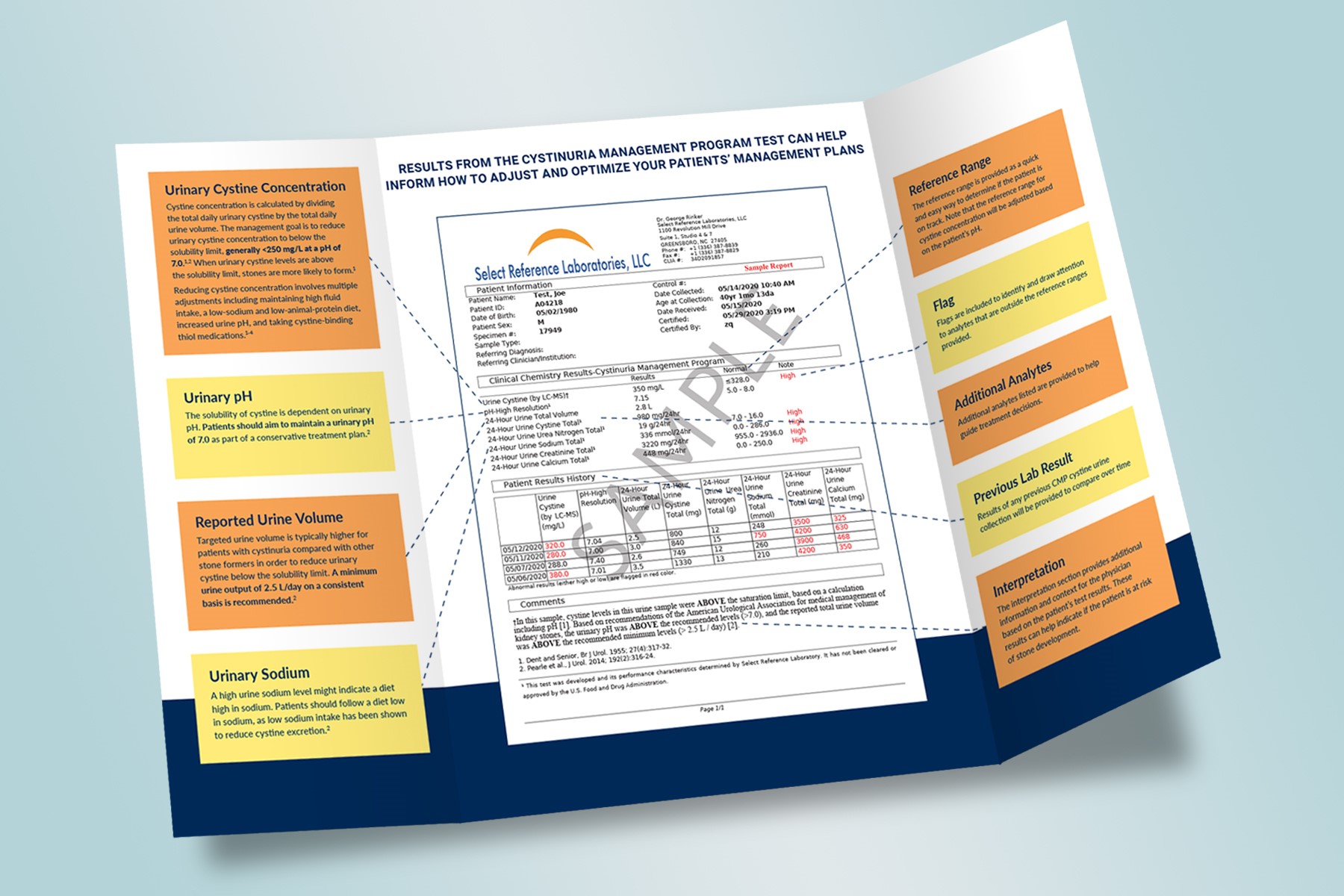 Program overview
Program overview
The Cystinuria Management Program is a comprehensive tool for managing patients with cystinuria
Cystine stones are different from other types of kidney stones1 and require regular and routine management.1-3 The Cystinuria Management Program is designed to help you and your patients actively monitor urinary cystine levels to assess your patients' risks of forming stones and make adjustments to their treatment plans, if necessary.
Patients
Will receive support from a dedicated case manager who will:
Contact them to explain the program, provide educational resources on the importance of monitoring urinary cystine levels, and answer any questions they may have about how to do the 24-hour urine collection
Schedule the delivery of their free 24-Hour Cystine Urine Test kits, which are mailed directly to them at the frequency designated by you (eg, every 3 or 6 months), and provide reminders to complete the 24-Hour Cystine Urine Tests
Let them know when their urine samples are being processed and when you have received their 24-Hour Cystine Urine Test results
Remind them to schedule follow-up appointments with you to review their test results
Healthcare Providers
Can expect the following from the Cystinuria Management Program:
Enrolling your patients diagnosed with cystinuria is simple. Follow the 2-step process in the How to enroll section
You will receive detailed and easy-to-interpret results from your patients' 24-Hour Cystine Urine Tests. Cystinuria Management Program test results provide important information to help you assess and optimize management plans for your patients with cystinuria to help them achieve their treatment goals of becoming stone-free4-5
Be sure to review Cystinuria Management Program test results with your patients so they can understand how their treatment plans can help reduce urinary cystine levels. The more knowledgeable your patients are about what causes their urinary cystine levels to become elevated, the more empowered they will be to better manage and take control of their cystinuria.
The Cystinuria Management Program can help make ongoing urinary cystine monitoring a regular part of your patients' management plans.
The Cystinuria Management Program is an essential tool for routinely monitoring your patients' treatment plans and informing your cystinuria management decisions to help patients achieve their treatment goals of becoming stone-free.4-5
Enrolling your patients is simple
For each patient you enroll, follow the steps below:
A dedicated case manager will contact your patient to explain the program and schedule delivery of the 24-Hour Cystine Urine Test kit. Once the laboratory receives the patient’s urine sample, results will be provided to you via fax within 10 to 14 business days.
THIOLA EC® (tiopronin, delayed-release tablets)
INDICATIONS AND USAGE: THIOLA EC® (tiopronin, delayed-release tablets) is indicated, in combination with high fluid intake, alkali, and diet modification, for the prevention of cystine stone formation in adults and pediatric patients ≥20 kg with severe homozygous cystinuria, who are not responsive to these measures alone.
Important Safety Information
CONTRAINDICATIONS: THIOLA EC is contraindicated in patients with hypersensitivity to tiopronin or any other components of THIOLA EC.
WARNINGS AND PRECAUTIONS:
- Proteinuria: Proteinuria, including nephrotic syndrome, and membranous nephropathy, has been reported with tiopronin use. Pediatric patients receiving >50 mg/kg of tiopronin per day may be at increased risk for proteinuria. Monitor patients for the development of proteinuria and discontinue therapy in patients who develop proteinuria.
- Hypersensitivity Reactions: Hypersensitivity reactions (drug fever, rash, fever, arthralgia and lymphadenopathy) have been reported.
ADVERSE REACTIONS: The most common adverse reactions (≥10%) are nausea, diarrhea or soft stools, oral ulcers, rash, fatigue, fever, arthralgia, proteinuria, and emesis.
DRUG INTERACTIONS: Avoid alcohol consumption 2 hours before and 3 hours after taking THIOLA EC as THIOLA EC is released faster in the presence of alcohol.
SPECIFIC POPULATIONS:
- Lactation: Breastfeeding is not recommended during treatment with THIOLA EC.
- Geriatric Use: Because elderly patients are more likely to have decreased renal function, care should be taken in dose selection, and it may be useful to monitor renal function.
Please click here for full Prescribing Information and additional Important Safety Information.
THIOLA® (tiopronin tablets)
INDICATIONS AND USAGE: THIOLA® (tiopronin tablets) is indicated, in combination with high fluid intake, alkali, and diet modification, for the prevention of cystine stone formation in adults and pediatric patients ≥20 kg with severe homozygous cystinuria, who are not responsive to these measures alone.
Important Safety Information
CONTRAINDICATIONS: THIOLA is contraindicated in patients with hypersensitivity to tiopronin or any other components of THIOLA.
WARNINGS AND PRECAUTIONS:
- Proteinuria: Proteinuria, including nephrotic syndrome, and membranous nephropathy, has been reported with tiopronin use. Pediatric patients receiving >50 mg/kg of tiopronin per day may be at increased risk for proteinuria. Monitor patients for the development of proteinuria and discontinue therapy in patients who develop proteinuria.
- Hypersensitivity Reactions: Hypersensitivity reactions (drug fever, rash, fever, arthralgia and lymphadenopathy) have been reported.
ADVERSE REACTIONS: The most common adverse reactions (≥10%) are nausea, diarrhea or soft stools, oral ulcers, rash, fatigue, fever, arthralgia, proteinuria, and emesis.
SPECIFIC POPULATIONS:
- Lactation: Breastfeeding is not recommended during treatment with THIOLA.
- Geriatric Use: Because elderly patients are more likely to have decreased renal function, care should be taken in dose selection, and it may be useful to monitor renal function.
Please click here for full Prescribing Information and additional Important Safety Information.


